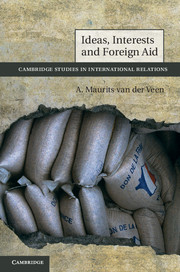Book contents
- Frontmatter
- Contents
- Figures
- Tables
- Preface
- 1 The many uses of foreign aid
- 2 One policy, multiple goals
- 3 Debates about aid
- 4 Aid frames
- 5 The administration of aid policy
- 6 The generosity contest
- 7 The popularity contest
- 8 Conclusion
- Appendix A Legislative debates coded
- Appendix B Debate coding examples
- Appendix C Aid distribution: data and sources
- Bibliography
- Index
Appendix A - Legislative debates coded
Published online by Cambridge University Press: 07 September 2011
- Frontmatter
- Contents
- Figures
- Tables
- Preface
- 1 The many uses of foreign aid
- 2 One policy, multiple goals
- 3 Debates about aid
- 4 Aid frames
- 5 The administration of aid policy
- 6 The generosity contest
- 7 The popularity contest
- 8 Conclusion
- Appendix A Legislative debates coded
- Appendix B Debate coding examples
- Appendix C Aid distribution: data and sources
- Bibliography
- Index
Summary
This appendix lists the parliamentary aid debates coded in each country. The main source of the data for each year is the debate about that year’s development cooperation budget. Sometimes additional debates were coded in the same year, such as general debates on the overall development assistance programme of the government. Occasionally, additional debates for the preceding year were included in order to get a slightly larger sample of speaking turns. This was useful particularly for Belgium and Italy, where aid debates have been both less extensive and more legalistic than in the Netherlands or Norway. As a result, each data point is less a snapshot than an average impression of the discourse over a two to three year period.
Belgium
Belgian budgets are debated in parliamentary committee first, before being reviewed and voted on in a plenary session. Both the Senate and the Chamber of Representatives have to approve the budget in a plenary session, but one Committee does the bulk of the work, preparing a report for the full session. In even years, the committee of the Chamber has this duty; in odd years, it falls to the Senate. The locus of initial discussion tends to feature more in-depth policy debates. For consistency’s sake, however, only debates of the Chamber or its committees were coded. The Minister or State Secretary in charge usually opens the committee debates, then takes a series of questions by committee members, and (usually, but not always) answers these. The plenary discussion features a brief report by the committee chair, followed by statements on the budget and on aid policy in general by representatives from all of the major parties, together with some additional questions for the Minister or State Secretary.
- Type
- Chapter
- Information
- Ideas, Interests and Foreign Aid , pp. 235 - 246Publisher: Cambridge University PressPrint publication year: 2011

